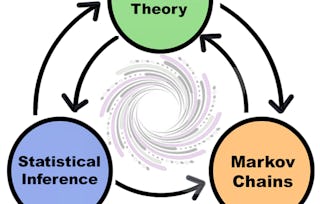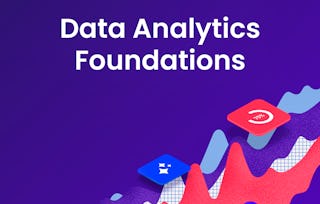This course takes a deep dive into the statistical foundation upon which data analytics is built. The first part of this course will help you to thoroughly understand your dataset and what the data actually means. Then, it will go into sampling including how to ask specific questions about your data and how to conduct analysis to answer those questions.

Statistics Foundations

Statistics Foundations
This course is part of multiple programs.

Instructor: Brandi Robinson
44,255 already enrolled
Included with
386 reviews
Recommended experience
What you'll learn
The basic principles of descriptive and inferential statistics
Use statistical analyses to make data-driven decisions
How to formulate and test hypotheses and take action based on the outcome
Skills you'll gain
- Spreadsheet Software
- Probability & Statistics
- Statistical Modeling
- Data Analysis
- Time Series Analysis and Forecasting
- Descriptive Statistics
- Regression Analysis
- Data Modeling
- Tableau Software
- Statistical Hypothesis Testing
- Statistical Inference
- Analytics
- Statistical Methods
- Sampling (Statistics)
- Marketing Analytics
- Statistical Analysis
- Bayesian Statistics
- Statistics
- Skills section collapsed. Showing 8 of 18 skills.
Details to know

Add to your LinkedIn profile
21 assignments
See how employees at top companies are mastering in-demand skills

Build your subject-matter expertise
- Learn new concepts from industry experts
- Gain a foundational understanding of a subject or tool
- Develop job-relevant skills with hands-on projects
- Earn a shareable career certificate

There are 5 modules in this course
This week you’ll get an overview of the Statistics for Marketing course and you will learn the basics of Descriptive Statistics and when to use them. You will also be introduced to Bayesian statistics. You will also get an overview of your capstone project and at the end of the week you will complete part one.
What's included
20 videos7 readings5 assignments
This week you will be introduced to inferential statistics and how to define samples and populations for marketing. You’ll also be introduced to the concept of variables. At the end of the week you will complete part two of your capstone project.
What's included
14 videos4 readings5 assignments
In week three, you’ll dig into how to formulate and test appropriate hypotheses for your business goals. You’ll wrap up the week with part three of your capstone project.
What's included
16 videos5 readings4 assignments
This week you’ll be introduced to various model families and how to create them using Tableau. You’ll also learn how to interpret the results of these models. You’ll complete the fourth and final part of your capstone project.
What's included
19 videos5 readings6 assignments
This week you will combine and apply all the information you have learned throughout the course and finalize your capstone project. You’ll finish out the course by hearing from a marketing analyst about how they apply the principles you learned in this course in the real-world.
What's included
6 videos1 assignment1 discussion prompt
Earn a career certificate
Add this credential to your LinkedIn profile, resume, or CV. Share it on social media and in your performance review.
Instructor

Offered by
Explore more from Marketing
 Status: Free Trial
Status: Free Trial Status: Free Trial
Status: Free TrialUniversity of Colorado Boulder
 Status: Free Trial
Status: Free TrialDeepLearning.AI
 Status: Preview
Status: Preview
Why people choose Coursera for their career

Felipe M.

Jennifer J.

Larry W.

Chaitanya A.
Learner reviews
- 5 stars
83.67%
- 4 stars
11.13%
- 3 stars
3.88%
- 2 stars
0.25%
- 1 star
1.03%
Showing 3 of 386
Reviewed on Oct 4, 2023
Great teacher Camron Dodd. He explained every topic in this course with excellence. I suggest it to everybody who is interested in Data Analytics.
Reviewed on Jun 12, 2024
Best course so far in this Professional Certificate
Reviewed on Nov 25, 2024
There were some errors in the videos, and I hope you can add how to download Tablue public or provide/use an alternative to it. thanks

Open new doors with Coursera Plus
Unlimited access to 10,000+ world-class courses, hands-on projects, and job-ready certificate programs - all included in your subscription
Advance your career with an online degree
Earn a degree from world-class universities - 100% online
Join over 3,400 global companies that choose Coursera for Business
Upskill your employees to excel in the digital economy
Frequently asked questions
To access the course materials, assignments and to earn a Certificate, you will need to purchase the Certificate experience when you enroll in a course. You can try a Free Trial instead, or apply for Financial Aid. The course may offer 'Full Course, No Certificate' instead. This option lets you see all course materials, submit required assessments, and get a final grade. This also means that you will not be able to purchase a Certificate experience.
When you enroll in the course, you get access to all of the courses in the Certificate, and you earn a certificate when you complete the work. Your electronic Certificate will be added to your Accomplishments page - from there, you can print your Certificate or add it to your LinkedIn profile.
More questions
Financial aid available,

